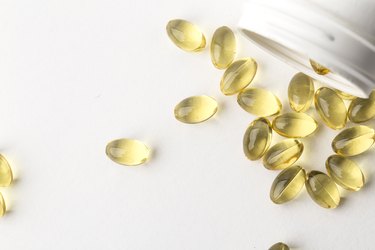
Normally you have to worry about getting enough vitamins and minerals in your diet to stay healthy. On the other hand, consuming too much of a vitamin can be just as harmful. You're at less risk of consuming too much of water-soluble vitamins like B12 than fat-soluble. However, you have to be careful with B12 because it's measured differently.
Tip
The RDA for vitamin B12 is 2 to 2.8 mcg, however, you can safely consume up to 1,000 mcg per day.
Video of the Day
Unlike some vitamins, vitamin B12 is measured in micrograms, not milligrams. A microgram is a thousandth of a milligram, so 500 mg of vitamin B12 is 500,000 micrograms.
Video of the Day
The recommended daily intake is between 2 and 2.8 micrograms. However, you can safely go well beyond that number. The max you should have per day is 1,000 micrograms, according to the Harvard School of Public Health, so 500 mcg per day is completely safe.
Overview of Vitamin B12
The body uses vitamin B12, along with the B-complex vitamin folate, to help produce DNA. B12 also helps to keep levels of some amino acids stable and to prevent damage to your nerve cells. Found primarily in animal products such as fish, poultry, eggs, milk and other dairy products, B12 is also used to enrich some grain products.
According to the University of Florida, adults who are not pregnant or breastfeeding require 2.4 micrograms of B12 a day, while pregnant women should get 2.6 micrograms and women who are breastfeeding should get 2.8 micrograms. You usually can get these amounts in your daily diet.
Vitamin B12 Deficiency
While vitamin B12 deficiency is generally rare in healthy adults, it occasionally occurs strict vegetarians, older adults or people whose bodies do not properly process vitamin B12.
According to the National Institutes of Health, there are certain populations who should check with their physician to see if they have a vitamin B12 deficiency. Those with megaloblastic anemia, delirium or dementia, celiac, Crohn's disease, or sometimes pregnant women. Vitamin B12 deficiency is usually treated by supplemented B12, either in pill form or as injections.
Tip
If you're deficient in B12, try eating seafood like salmon or oysters.
Vitamin B12 and Anemia
A deficiency of vitamin B12 can contribute to your developing a type of anemia called megaloblastic or pernicious anemia. Because vitamin B12 is used in the production of red blood cells and the maintenance of the nervous system, a deficiency can cause your body to manufacture inadequate red blood cells.
Pernicious anemia may have no symptoms and occurs most frequently in people who suffer either from an autoimmune disorder or who have a disease of malabsorption that prevents their bodies from absorbing enough vitamin B12. Treatment for this type of anemia depends on its severity, but usually involves B12 supplements.
Contraindications of Vitamin B12
If you aren't taking a B12 supplement, toxicity isn't an issue. Since B12 is a water-soluble vitamin, it won't build up in your body. There are some situations in which you should not take supplements or high doses of vitamin B12.
If you have Leber's disease, large doses of vitamin B12 could lead to damage in your optic nerve and even blindness. If you have an allergy to cobalt, you should avoid vitamin B12 supplements until you have discussed it with your physician. Let your doctor know if you are pregnant or breastfeeding, and discuss any other medications or supplements you are taking.